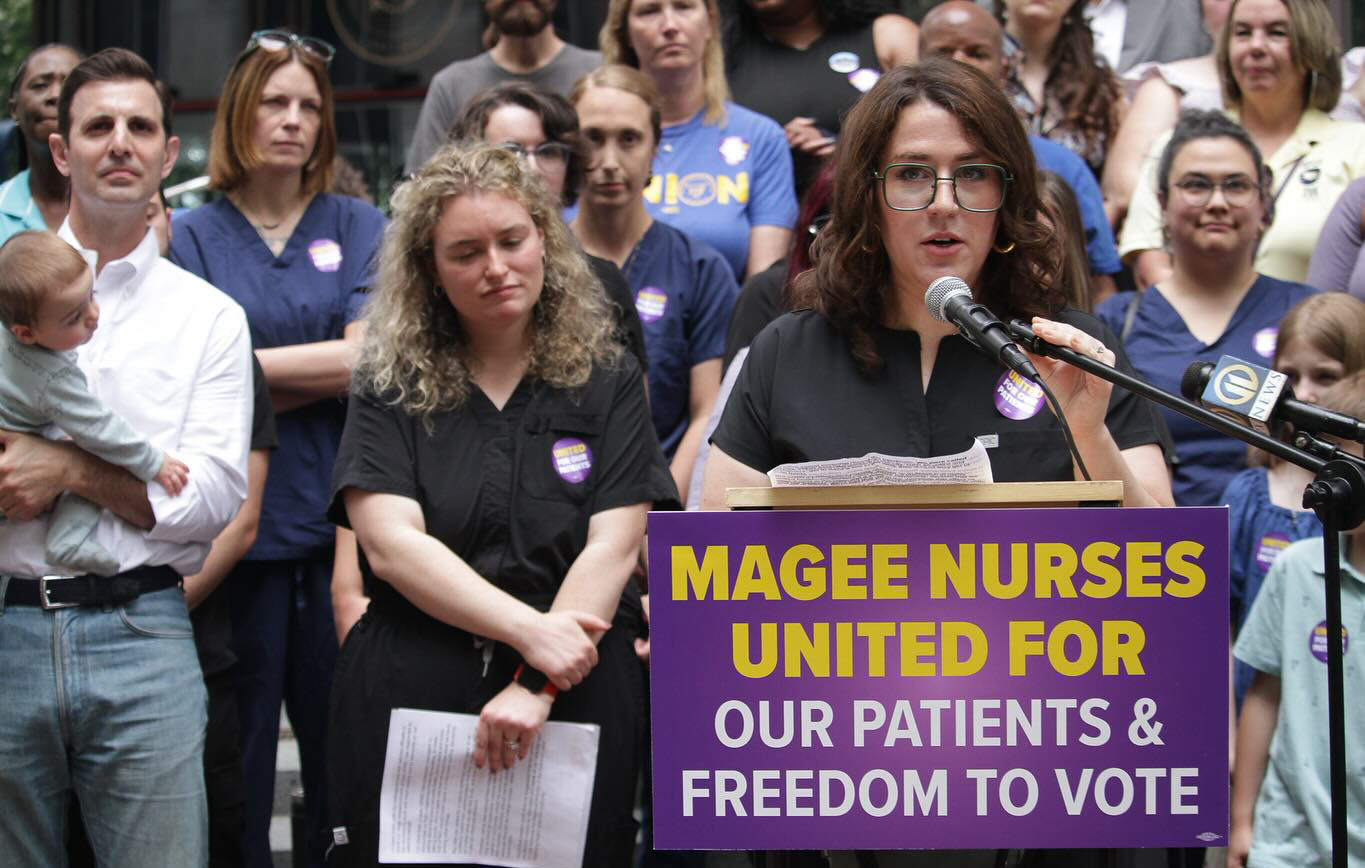Hundreds of nurses employed by the University of Pittsburgh Medical Center — the city’s largest employer — say they are having to fight just to schedule a union election. Meanwhile, their employer is justifying delays by citing the Trump administration’s changes to the National Labor Relations Board.
On June 13, a throng of scrub-clad nurses and supporters gathered in the damp shadow of Pittsburgh’s iconic U.S. Steel Tower — which now bears the UPMC logo across its roofline. Joined there by a range of elected officials, including city councilmembers, U.S. Reps. Summer Lee and Chris Deluzio, and Pittsburgh’s mayor, Ed Gainey, they demanded a date for their union election.
“We all knew that [the University of Pittsburgh Medical Center] didn’t want us to have a voice in the hospital, but not even a vote?” Alix Levy, a nurse in the emergency department at UPMC Magee-Womens Hospital, said to the crowd.
The University of Pittsburgh Medical Center did not respond to a request for comment.
On May 27, nurses with UPMC Magee-Womens Hospital filed a petition for a union election with the labor board’s regional office in Pittsburgh. They had been organizing with SEIU Healthcare Pennsylvania since last year in response to problems they say make for bad jobs and worse care for patients: chronic understaffing, low wages and high turnover. (Disclosure: SEIU is a financial supporter of Capital & Main.)
“It’s not about us,” said Clare Duffus, a registered nurse in the postpartum unit at Magee Hospital. “It’s [also] about our patients.”
* * *
On June 6, the University of Pittsburgh Medical Center argued that union elections cannot proceed given that the National Labor Relations Board is currently without a quorum, according to a pre-hearing statement filed with the board. The agency has been without a quorum off and on since President Trump fired board member Gwynne Wilcox in January and courts variously stayed the order or reinstated her; her case is pending.
Data from the labor board suggest that a quorum is not required to schedule a union election. In February, the most recent full month that the agency was without a quorum and for which data is available, 91 union elections were certified by the board. Of these, two elections were in Pittsburgh’s region.
“Regional offices can, of course, conduct elections and certify the results,” said Jennifer Abruzzo, who served as the labor board’s general counsel during the Biden administration, in a June 11 congressional hearing.
The hospital system also argued against an election by saying that senior nurses who help support staff during their shifts constitute supervisors. The Magee nurses disagree and say that such nurses have no say in scheduling or other management responsibilities. They also point to other University of Pittsburgh Medical Center unions in the area, where such nurses are members.
Elected officials including Mayor Gainey and state legislators from the area sent a letter to UPMC urging leadership to allow the election to go forward, writing, “Public resources are provided to UPMC for patient care purposes and not for anti-union activity to violate the right to organize.”
* * *
Workers often spend years building support for a union campaign before petitioning the National Labor Relations Board, which administers labor law, for an election. When an employer does not object to the election request, regional directors typically schedule elections within 30–40 days of a petition, according to data from the agency. If an employer objects, the timeline begins to stretch, and a regional director may need to order an election. Employers may be growing emboldened: Unfair labor practice charges alleging refusal to bargain have increased over the first six months of the Trump administration compared to the first six months of 2024.
“The NLRB too often has to deal with employers abusing the NLRB’s processes by trying to delay employee choice and undermine union support,” said Abruzzo, in an email to Capital & Main. The University of Pittsburgh Medical Center’s arguments “have no place in a pre-election hearing,” she added.
UPMC is joining a growing trend of employers challenging the basic function of the labor board. Most notably, Amazon, Trader Joe’s, SpaceX and the University of Southern California have attempted to suppress worker organizing campaigns by arguing that the board itself is unconstitutional.
Whatever the reasoning the University of Pittsburgh Medical Center puts forward, said Duffus, the health system’s strategy is clear. UPMC is “putting money and resources into delay tactics,” she said. “We just want a free and fair election.”
Copyright 2025 Capital & Main


 Column - State of InequalityJanuary 22, 2026
Column - State of InequalityJanuary 22, 2026
 The SlickJanuary 20, 2026
The SlickJanuary 20, 2026
 Latest NewsJanuary 21, 2026
Latest NewsJanuary 21, 2026
 Latest NewsJanuary 22, 2026
Latest NewsJanuary 22, 2026
 The SlickJanuary 23, 2026
The SlickJanuary 23, 2026
 The SlickJanuary 27, 2026
The SlickJanuary 27, 2026
 Column - State of InequalityJanuary 29, 2026
Column - State of InequalityJanuary 29, 2026
 Latest NewsFebruary 3, 2026
Latest NewsFebruary 3, 2026

